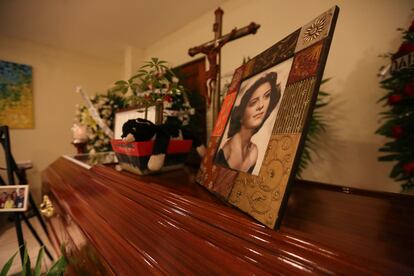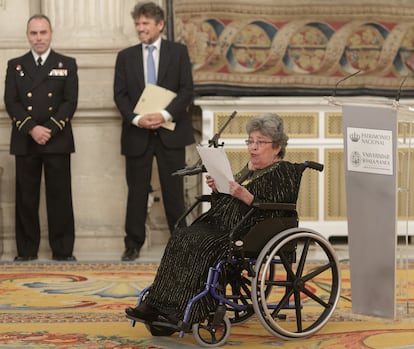The pilgrimage of the Central America Counts in Exile festival lands for the first time in Panama. The literary contest promoted by the Nicaraguan writer and Cervantes Prize winner, Sergio Ramírez, brings together from May 22 to 26 more than 50 voices from literature, film, music and journalism from 15 countries in the region, who will reflect on the challenges facing the isthmus, that fragile strip of land that unites the continent and that has a history full of violence, of regimes allergic to control, but also of lush literary production. In fact, this year the festival is dedicated to the Nicaraguan-Salvadoran writer Claribel Alegría, one of the most prominent voices in Latin American poetry and winner of the Reina Sofía Ibero-American Poetry Prize, for the centenary of her birth.
This is the 11th edition of the literary meeting, after he had to go into exile due to Daniel Ortega’s violent repression against critical voices in Nicaragua. ‘Centroamérica Cuenta’ was born in Managua with the idea of becoming a free space for the discussion of ideas, the problems of the region and the visibility of Central American literary creation.
The opening of the festival begins with a tribute to Alegría, the poet related to the so-called Committed Generation, whose authors – among them the Salvadoran Roque Dalton – were greatly influenced by the Central American reality, a region sunk in inequality, oblivion and bled by dictatorships and civil wars. “They say that my poetry is committed, but it is not committed poetry. What happens is that the suffering of my people is reflected in me, because I am a human being before being a poet and what my people suffer hurts me a lot,” Alegría said in an interview with this newspaper. The poet Gioconda Belli has said that Alegría’s poetry “maintains an exquisite balance.”
Belli stated during the delivery of Alegría’s literary legacy to the Cervantes Institute of Madrid in October, that “the life that Claribel told in her poems was a full life where there was no lack of love, nor tension, nor doubts, nor other people’s pain as well as motherhood, or the insidious traps of everyday life and its comforts.” “In her poetry,” she added, “the range of themes, the breadth of her gaze never ceases to produce revelations and a radiance sometimes seen behind a crack or in the light of lightning. Details and twists give her verses a dense and fascinating complexity. The intimacy and depth of her voice is a prodigy of precision, of simplicity. What she says she says without trumpet announcements, without artifice.” Belli will present the collection on May 23 All Poetry (1974-2020), that brings together his lyrical production throughout a life.

In addition to the tribute to the Central American poet, the festival begins with a conversation between the Panamanian singer-songwriter and former Minister of Culture, Rubén Blades, and the Cuban author Leonardo Padura, author of books such as The Man Who Loved Dogs. In the talk, both artists will share their passion for art and explore how music and literature are intertwined in their respective works. The conversation will take place at the National Theater in Panama City.
The challenges facing Central America will be analyzed in conversations such as the one that will take place on Friday: The Accounts of Central America: Justice without impunity?, which will be led by the former president of Costa Ria Luis Guillermo Solís. In this discussion “participants will delve into justice and impunity. The antecedents that have driven the search for justice without impunity in Latin America will be explored and its repercussions in Central America will be reflected on,” the organization explains. Another conversation is From shore to shore: Central America and the Caribbean, in which the writer Sergio Ramírez will chat with Leonardo Padura (Cuba), José Mármol (Dominican Republic) and Consuelo Tomás Fitzgerald (Panama) about the history and culture shared by both regions and how the Caribbean narrative has influenced the construction of the cultural identity of Central American and Caribbean countries.
Ramírez, 2017 Cervantes Prize winner, will present his new book at the festival, The golden horse (Alfaguara), a book that according to Berna González Harbour, “rides precisely between those two capacities, those of the foreign and the own: it draws an old Europe that staggers in the decline of the Austro-Hungarian Empire and travels through it until it takes us to its sentimental Nicaragua. . In this way, Ramírez merges and embroiders two universes, not only geographical, but also literary: at times he is a Latin American Dostoevsky in action, at times a Central European Cervantes entertaining in the Carpathians. His murderers kill like Raskolnikov and pursue dreams like Don Quixote and Sancho. “We’re going to laugh for a while.”
Ramírez himself has announced that next year the festival will be dedicated to the Nicaraguan poet Ernesto Cardenal, a key figure in liberation theology and moral voice of the Sandinista revolution. Critic of the Government of Daniel Ortega, the poet was persecuted by the regime until his death, with the assault of Sandinista hordes on the Managua Cathedral where his funeral was held. “Nicaragua has two great writers: Claribel Alegría, Nicaraguan-Salvadoran, has that double virtue; and Ernesto Cardenal. Both celebrate their centenaries a year apart. This year Central America Account is dedicated to Claribel, next year to Cardenal. This means paying tribute to creators who have crossed the Central American borders,” said Ramírez, the Nicaraguan writer who went into exile, who keeps the festival of letters and Central American journalism alive in his pilgrimage also in exile.

